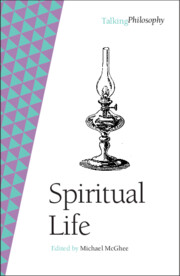Book contents
- Spiritual Life
- Talking Philosophy
- Spiritual Life
- Copyright page
- Contents
- Contributors
- Preface
- Introduction
- 1 Philosophy and Religion in the Thought of Kierkegaard
- 2 De Consolatione Philosophiae
- 3 The real or the Real? Chardin or Rothko?
- 4 Love and Attention
- 5 Descartes’ Debt to Augustine
- 6 Visions of the Self in Late Medieval Christianity: Some Cross-Disciplinary Reflections
- 7 Refined and Crass Supernaturalism
- 8 Religious Imagination
- 9 Moral Values as Religious Absolutes
- 10 Revealing the Scapegoat Mechanism: Christianity after Girard
- 11 Philosophy vs. Mysticism: An Islamic Controversy
- 12 Non-Conceptuality, Critical Reasoning and Religious Experience: Some Tibetan Buddhist Discussions
- 13 ‘Know Thyself’: What Kind of an Injunction?
- 14 Facing Truths: Ethics and the Spiritual Life
- Index
- References
Introduction
Published online by Cambridge University Press: 18 April 2024
- Spiritual Life
- Talking Philosophy
- Spiritual Life
- Copyright page
- Contents
- Contributors
- Preface
- Introduction
- 1 Philosophy and Religion in the Thought of Kierkegaard
- 2 De Consolatione Philosophiae
- 3 The real or the Real? Chardin or Rothko?
- 4 Love and Attention
- 5 Descartes’ Debt to Augustine
- 6 Visions of the Self in Late Medieval Christianity: Some Cross-Disciplinary Reflections
- 7 Refined and Crass Supernaturalism
- 8 Religious Imagination
- 9 Moral Values as Religious Absolutes
- 10 Revealing the Scapegoat Mechanism: Christianity after Girard
- 11 Philosophy vs. Mysticism: An Islamic Controversy
- 12 Non-Conceptuality, Critical Reasoning and Religious Experience: Some Tibetan Buddhist Discussions
- 13 ‘Know Thyself’: What Kind of an Injunction?
- 14 Facing Truths: Ethics and the Spiritual Life
- Index
- References
Summary
There is a familiar conceptual slope down which philosophers of a certain temper slide when they come to the analysis of religion, and perhaps they do so on purpose, because we like to bring the discussion round to what we can talk about, and if we are sufficiently dominant we become the ones who define what it is proper to say, though the consequence be the stilling of other voices, who may have spoken with understanding.
- Type
- Chapter
- Information
- Spiritual Life , pp. 1 - 13Publisher: Cambridge University PressPrint publication year: 2024

